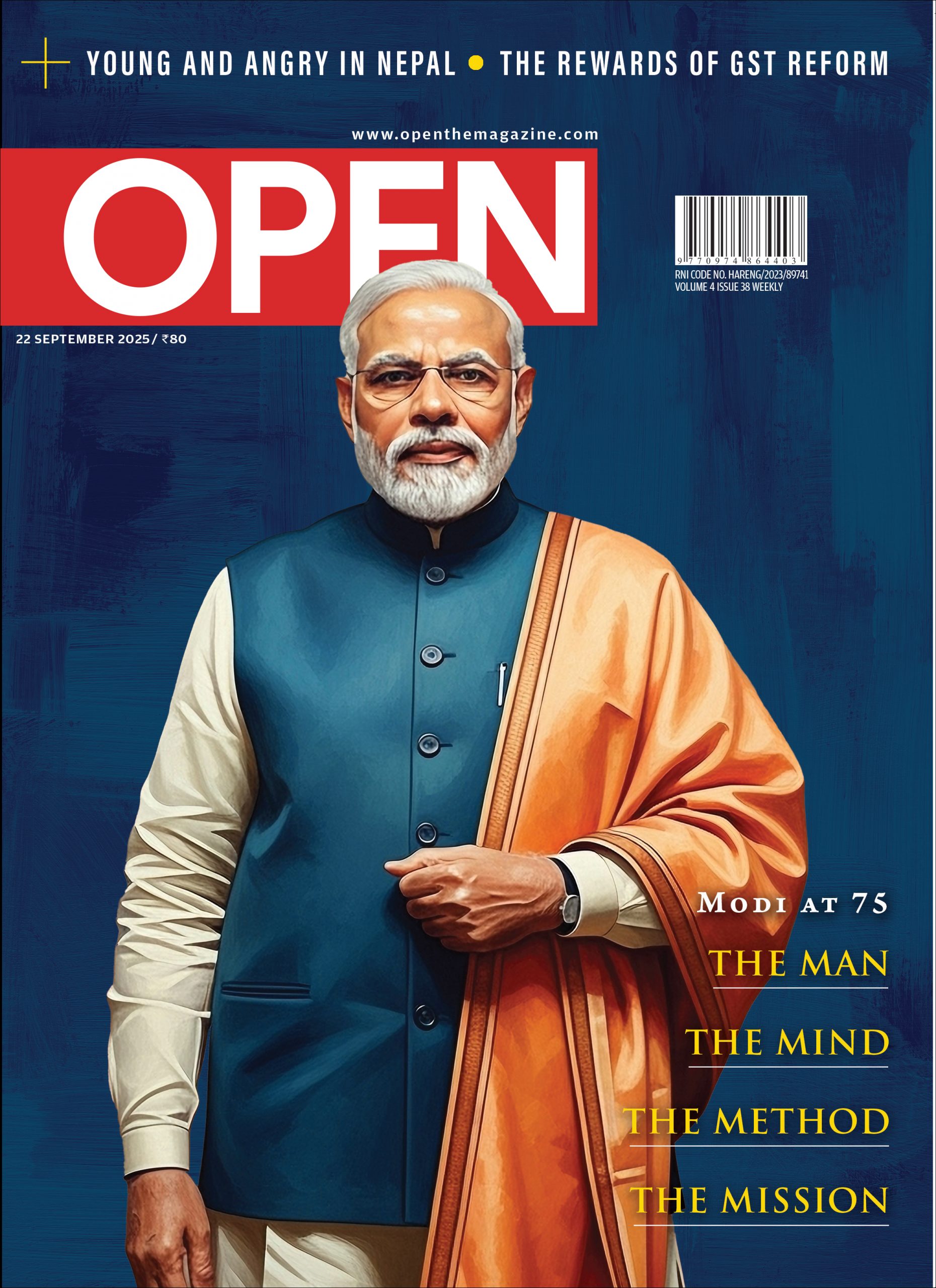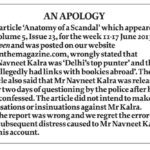The Fall of the Middlewoman
Niira Radia and the story of an experiment in corporate lobbying that failed
 Alam Srinivas
Alam Srinivas
 Alam Srinivas
|
02 Nov, 2011
Alam Srinivas
|
02 Nov, 2011
/wp-content/uploads/2015/11/middlewoman.jpg)
Niira Radia and the story of an experiment in corporate lobbying that failed
Who is Niira Radia? Is she a social butterfly, who could once brazenly walk into any exclusive party held in Delhi and mix comfortably with the Capital’s crème de la crème? Is she a lobbyist, someone who is on first-name basis with Cabinet ministers, senior bureaucrats and leading businessmen? Or is she part of a new corporate experiment, a slice of an expanding mindset, that aims to outsource one of the most critical functions of an Indian business organisation—managing the external environment?
Radia, who became a household name after Open published a set of controversial and revealing transcripts of her phone conversations with high-profile journalists last year, is all of the above—and more. It is crucial to understand and accept her multi-faceted, chameleon-like and often contrasting traits to understand the ‘real’ Radia. These will help decode the reason why this ‘fighter without a pause (but with several causes)’ gave up everything. Why she decided to vanish into the blue.
On 30 October, Radia, whose list of clients for public relations and lobbying included two of the country’s most powerful businessmen, Ratan Tata and Mukesh Ambani, alongwith companies like Unitech, Vedanta (of Anil Agarwal) and Star TV, abruptly shut shop. In a crisp email to her 300-odd employees, across several firms such as Vaishnavi Corporate Communications, Neucom Consulting and Neosis Strategic Consulting Services, she said that she was calling it a day.
It came as a rude shock for the employees. Until recently, despite RadiaGate (legally-tapped conversations that became public), her alleged involvement in the Rs 176,000 crore 2G scam, interrogations by the Enforcement Directorate (ED) and CBI, and a complete loss of professional face, Radia had kept her spirits high. At the beginning of this year, she even announced huge ‘retention’ bonuses for most of her firms’ staff members, paid in two installments, to allay fears that the Vaishnavi Group’s business may come to a halt.
So, what changed her mind? But first, before we answer that, a few words on Radia’s disgraceful fall. Last year, Indians heard the contents of hundreds of phone conversations that had been recorded by the Income Tax Department in late 2008 and mid-2009 and leaked thereafter. These included discussions that she had had with former Telecom Minister A Raja, telecom bureaucrats, political and business lobbyists like Ranjan Bhattacharya (foster son-in-law of former Prime Minister AB Vajpayee) and Manoj Modi (of the Ambani-owned Reliance Industries) and journalists (Vir Sanghvi, former editorial director, Hindustan Times, and Barkha Dutt, group editor, English, NDTV, among others).
The Radia Tapes mesmerised the country, as they revealed how Radia was able to influence New Delhi’s policymaking process, bend a few rules here and there to benefit her business clients, manipulate the media to reflect her ‘vested’ interests, and pressure journalists and middlemen to act as go-betweens between her and senior leaders of the UPA. It established the Clout of the Lobbyist in this country.
The tapes forced people to sit up and listen to what they had merely heard about or suspected: behind-the-scenes shenanigans in New Delhi’s corridors of power.
Now, let’s go back to the question and its answer. After being embroiled in several controversies, Radia’s foremost priority was to protect her first and most profitable client, Tata. This was successfully managed when the CBI told several courts that it had no evidence against India’s ‘most credible’ businessman in the ongoing investigations in the 2G scam. The agency did not name Tata in its chargesheets; it also made Radia a witness, rather than charge her.
There is little doubt that Radia, half of whose group’s Rs 100-crore annual turnover came from handling the PR of the Tata Group’s 90 odd firms, is extremely close to Tata. This is evident in one of the now-public phone conversations, where the two had a ‘personal’ chat about her evening gown. As a journalist, I have seen their association from close quarters: at a Tata Motors event in Mumbai, Tata was eating out of her hands. She had instant access to him without any gatekeepers.
However, the how and why of Radia’s proximity to Tata are still closely guarded secrets. Some reckon that the latter was impressed with her when she handled the Tata Group’s bid to enter the civil aviation business in partnership with Singapore Airlines in the 1990s. Others contend that Nusli Wadia of Bombay Dyeing and RK Krishna Kumar, director, Tata Sons, were instrumental in fostering the relationship.
What is known is that Radia, who has a British passport and Person of Indian Origin status, came to India from London in the early 1990s, quickly became an aviation consultant for the Sahara Group, Singapore Airlines (and Tata), and Airbus, and befriended Ananth Kumar, India’s aviation minister in 1998-99 during the BJP-led NDA regime. By 2001, she was firmly in the ‘Tata’ saddle, and her first success came during a crisis in Tata Finance the same year, when its managing director was accused of financial irregularities.
Thus, in the 2G scam case, it was imperative for Radia to safeguard the interests of the Tata Group. Once she and Tata were off the CBI’s investigation radar, it also came as a relief to her friends and colleagues within the Vaishnavi Group, which had former bureaucrats like Pradip Baijal of Trai and Finance Secretary CM Vasudev. Once the CBI decided not to indict her, or her firms, they had no reason to expect any imminent action either.
But there was a small, albeit important, hitch.
The political establishment insisted that, as a quid pro quo, Radia had to exit the lobbying business, at least for a while. This was for two reasons. One, if she continued, there would be constant pressure from the media and civil society to pursue the cases against her; if she exited, they might have relented a bit. Two, her disappearance would give a legitimate excuse to the CBI and ED to quietly close the relevant ‘Radia’ files in the near future.
Now, Tata, more than Ambani, had to fix the timing of her exit. This hinged on the nature of the services that the Vaishnavi Group provided. Says an owner of a leading PR firm, “If the Tata Group paid Vaishnavi Rs 50 crore a year, going by publicly available information, the work involved was more than just PR and lobbying. To give a comparison, a large PR firm like that would normally bill Rs 15-20 crore if it had 70-80 clients—almost the number of firms in the Tata Group.”
If one goes by this logic, it would imply that the contract signed between Vaishnavi and Tata, or for that matter between Neucom and Ambani, came with strings attached. It included safety clauses, like golden parachutes or payments for six months if the deal were arbitrarily cancelled. “The outgo on these accounts could have been higher, rather than allowing the contract to come up for renewal and then disband the relationship,” explains Dilip Cherian, head of Perfect Relations. Radia’s decision to quit was announced just one day before her contract with the Tata Group expired.
There was another factor at play. After the Radia Tapes’ leak, it was practically impossible for the Queen of Lobbying to conduct her business in a normal fashion. At some of Delhi’s parties, she was treated more like an unwanted mosquito than a social butterfly. Politicians, bureaucrats and powerful middlemen cringed at the prospect of talking to, meeting or even coming across her. Her face was well recognised across India, since it had been flashed on pages and pages of newsprint and almost all TV news channels.
Radia’s success was delicately balanced on who she knew in New Delhi’s power circles, and how well she knew them. In the 1990s, she had unquestionable access to Vajpayee, Bhattacharya and Ananth Kumar. In the recent past, her friends included Raja, Tarun Das (former secretary general, CII), and editors of leading TV news channels and publications. Without their support and help, she had no special status. She was like any other PR professional or lobbyist.
In hushed whispers, government insiders talked about how her sordid professional past may come to hound her again. During the Tata-Singapore Airlines days, she had made an enemy of Jet Airways’ Naresh Goyal. The latter, according to a source in the know, had had details dug up of her alleged financial irregularities in London. Also, the ED had found some extraneous, but not provable, links between Radia and foreign intelligence agencies. In fact, even before the Radia Tapes, there were moves among Indian investigating agencies to proceed legally against her.
Her clients realised that she could not justify the high fees they paid her firms. Without the huge income, Radia was in no position to retain her ‘high-fliers’, whose annual salaries ranged from Rs 60 lakh to a few crore. “The business model she had carefully constructed over the past decade depended on revenues that were several times higher than those earned by competitors. If she had to play by the traditional rules now, the game was over,” says a senior lobbyist in Delhi.
Unfortunately for Radia, she was at the forefront of a grand experiment that ended badly, one that sought to radically reform corporate lobbying in India. She hoped to truly professionalise the arena, combining PR and lobbying with the shadowy aspects of how Indian promoters have traditionally managed the external—read political—environment. She hoped that in the near future, India Inc, especially family-owned businesses, would confidently hand over this responsibility to external professionals.
However, to understand this phenomenon, one has to know about the history of lobbying in India. “Until the 1980s, it was the businessman, along with a few loyalists, who handled interactions with politicians, bureaucrats and media editors. PR was entrusted to a small team in the corporate communications department. The launch of a large number of consumer goods and services in the mid-1990s required the expertise of an external PR firm. It led to a boom in the sector,” says Murad Ali Baig, who has lobbied on behalf of Escorts and Reliance Industries in the past.
While a typical company’s promotional and media activities were outsourced, lobbying remained an internal function. But in the 1990s, it underwent a huge change. Earlier, the entrepreneur had to deal with one party, the Congress, and that too, only with a few of its top leaders, especially the coterie around the PM. In the 1990s, coalition politics compelled them to engage with dozens of political parties and scores of leaders. Even an MLA could create problems if a factory was located in his/her constituency.
So, to manage all manner of vested interests, big business houses created huge internal teams as well as hired external individuals. For example, Ambani or Tata had 50-100 employees, and dozens of external professionals handling their requirements. Radia aimed to change this dual structure. She wanted to combine both internal and external responsibilities into a single, external and monolithic entity, which would be guided by her and enjoy the complete trust of her client(s).
It began successfully, as Tata and Ambani sacked their internal teams, and hired Radia. They did it for different reasons, though. In the early 1990s, after facing down rebellious group CEOs/part owners such as Russi Mody (of Tata Steel) and Darbari Seth (of Tata Chemicals), Group Chairman Tata did not want to face similar trouble. He centralised key functions in Tata Sons, one of these being lobbying. But since Tata Sons needed a huge establishment to perform such tasks, it was simpler to outsource it to a loyalist like Radia.
Mukesh Ambani did it because of his fight with his younger brother, Anil. Mukesh understood that the sporadic but relentless guerilla tactics of his sibling were best countered by an external firm. Since Anil knew Mukesh well, he was able to anticipate the reactions, or actions, of his brother. Only an outsider could think differently enough to put Anil in a spot. However, Mukesh retained his key loyalists within the group, who helped maintain a distance between him and Radia.
This did not mean that Tata and Ambani stopped their personal interactions with politicians and bureaucrats. Radia was an integral but additional component to their lobbying activities. Tata wrote personal letters to M Karunanidhi, leader of the DMK, a party to which Raja belongs. Ambani met the Finance Minister at least once a week. So, while the main battles were led by them, the sniping, unplanned confrontations and hand-to-hand warfare were left to Radia.
Sadly, Radia finally failed in her endeavour. She made too many enemies herself, as is clear from the Radia Tapes. She openly criticised competitors of the Tata and Reliance groups in sectors such as oil and gas, plotted against them, and cajoled policymakers to frame policies that would go against them. In the process, her clients’ other foes also got added to her list of enemies. More importantly, while competitors may have found it difficult to directly attack Tata or Ambani, she became an easy target. Since she enjoyed the confidence of her clients, the latter would suffer if her credibility were hurt. Finally, this is what happened. Corporate and political intrigue undid both Radia and her business vision.
After the Radia fiasco, both Tata and Ambani are returning to their old PR practices. The latter has decided to absorb two dozen people from Radia’s team in Reliance Industries. Tata has followed a two-pronged strategy: he wants to re-establish small PR divisions in most of his important companies, but has also hired Rediffusion Y&R and Edelman as external agencies. So, while Rediffusion’s Arun Nanda may take on Radia’s role (to the extent possible), his brief may not be quite as weighty and he may not enjoy the same clout. Individual CEOs in the Tata Group are likely to have more say in PR matters.
In retrospect, according to a few PR and lobbying professionals, this experiment was always doomed. “Lobbying by its very nature is personal, and has to be on a one-to-one basis. You cannot outsource it to an agency. A minister will meet me, but may refuse my junior colleague who he doesn’t know,” says Baig. “The underbelly of lobbying has to remain with the promoter and his key loyalists, simply because of its confidential nature,” adds Cherian, “How can it be done by someone you don’t trust?” Or someone who has been exposed by your competitors?

/wp-content/uploads/2025/09/Cover-Modi-scaled.jpg)











More Columns
I Missed A Flight Thanks To Robert Redford, Plus He Took My Magazine! Alan Moore
Robert Redford (1936-2025): Hollywood's Golden Boy Kaveree Bamzai
Surya and Co. keep Pakistan at arm’s length in Dubai Rajeev Deshpande